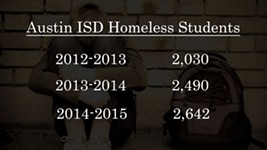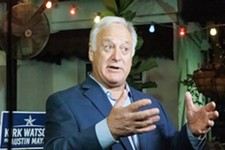City Plans New Emergency Homeless Shelter, But Without Much Community Input
A Southeast Austin warehouse will soon become a shelter
By Austin Sanders, 4:50PM, Fri. May 12, 2023

As Austin struggles to provide enough emergency shelter beds for the thousands of people living without shelter on any given night, the City of Austin announced, May 12, that they would convert a city-owned warehouse in Southeast Austin into a temporary shelter for 300 unhoused and unsheltered individuals that could open this fall.
The announcement was met with mixed reaction from people involved in the city’s Homeless Response System. Emergency shelter needs are certainly urgent. But the shelter plan, which appears to have been made with little input from stakeholders in the homeless response community, raised concerns among some advocates and officials, who worry that the plan may be shortsighted.
A memo from Interim City Manager Jesús Garza announcing the plan indicates that the shelter would operate for approximately one year and could be just one among other temporary shelters the city attempts to stand up in the immediate future. The new temporary shelter would be located at the Marshalling Yard, which the Austin Convention Center Department currently uses as a staging area during large events. The 70,000 square foot warehouse is used to reduce vehicle congestion downtown, especially from large trucks, when planners are preparing for large events. It’s located on Airport Commerce Drive near the intersection of U.S. 183 and SH 71, directly next to the Esperanza Community, a successful transitional shelter compound operated by The Other Ones Foundation. But TOOF won’t be bidding on the contract. “The Marshalling Yard is out of the scope of work that TOOF engages in,” communications director Max Moscoe said. “But we wish the best to whoever steps up to operate it.” Both facilities would be located in D3; Council Member José Velásquez, who represents the majority-Latino southeast district, embraced the new shelter.
“We need to get people off the streets and into permanent supportive housing and not continue to exacerbate the issue by perpetuating a destabilizing cycle,” Velásquez told us. “D3 is a very compassionate district and we welcome the opportunity and support to get our unhoused neighbors the resources that they need.”The city intends to create an additional 130 shelter beds by converting the single-room “bridge shelter” facilities in North and South Austin into double-occupancy rooms. Bridge shelter guests have always had the option of doubling up if they belonged to the same household, but converting all of the rooms to double-occupancy would fundamentally change the nature of the program. Bridge shelters came online in the early days of the COVID pandemic as a way of providing safe shelter to medically vulnerable people living on the streets. They have remained in operation, with the prospect of single-occupant rooms being a core part of their appeal. It is unclear how much money will be required for the bridge shelter conversions, but a city spokesperson says new funding will be made available from “other sources.” Congregate shelter, like that offered at the Salvation Army or the Austin Resource Center for the Homeless (ARCH) have begun to fall out of favor with homeless response leaders throughout the nation, with non-congregate type shelters that offer people the comfort and security of an individual room becoming more popular.
Austin has a dearth of emergency shelter beds available to people living without shelter. The Ending Community Homelessness Coalition, the lead agency that coordinates efforts aimed at reducing homelessness in the Austin-Travis County Continuum of Care (CoC), estimates that the approximately 5,000 people living without shelter in Austin on any given night have access to just 900 emergency shelter beds. “Clearly, there is a critical need to increase shelter space,” the memo reads. “Austinites seeking to comply with reinstated local and state prohibitions on camping on public property urgently need a safe place to sleep.”
The Request for Proposal document used by the city to solicit bids to operate the shelter offers more details on what the facility could look like. Providers will submit their plans to the city, staff will score them, and Council will ultimately award a contract to one. According to the document, an unspecified amount of the 70,000-square-foot Marshalling Yard warehouse will be used for the shelter. It will be referral only, so people cannot walk up and request a bed. Beds will not be available to people with children (they’ll be referred elsewhere), but the provider should be able to offer separate space and amenities, like bathrooms and showers, to people of different gender identities. The facility will be operated as “low-barrier shelter” which means people could potentially bring along pets and belongings, and not be required to adhere to stringent sobriety or behavioral requirements that often turn some away from accessing shelter services.
The shelter would be funded through $9.142 million of “unencumbered homelessness funds” from the American Rescue Plan Act (ARPA) Investment plan, the roughly $188 million in relief funds the city received from the federal government during 2021 in response to the COVID-19 pandemic. But unencumbered doesn’t mean that the funds were not already allocated for another purpose, it just means the city has not yet committed them to a contract. It is unclear how much, if any, of the $9 million that will be used to operate the shelter was intended for another use. The $9 million allocation is intended to fund both changes to the physical structure of the warehouse to make it more hospitable and operations once it opens as a shelter, possibly as soon as this fall.
Sources familiar with the plan indicated it was “very top-down,” with the City Manager’s Office seeking little input from Council offices or other stakeholders. “We were consulted, not informed,” said one source. It appears only two Council Members were notified of the plan, and when that happened, the conversation was more a head’s up than a request for feedback. One concern is the cost of the shelter operation, which could amount to about $30,000 per person if it is fully utilized. Another concern is city leaders may not have sufficiently considered how unhoused people placed at the shelter will be moved out into longer-term housing (Garza’s memo does not mention a program aimed at moving people from the shelter into permanent housing).
“Austin has a need for emergency shelter, but even our emergency plans should be designed with proper planning and input from stakeholders,” João Paulo Connolly, Organizing Director with the Austin Justice Coalition, said of the plan. “This part of the plan did not involve consultation with any of the stakeholders in Austin’s Homeless Response System. Neither the CoC Board, Leadership Council, nor any of the committees or working groups in our governance were consulted on any of these plans.”
Connolly also said it was “crucial to get the perspectives of clients and people with lived experience around these kinds of initiatives so we don’t repeat the mistakes of the past.” He referenced recent, abrupt announcements about operations at the ARCH and the Salvation Army of Austin’s downtown shelter – two of the largest emergency shelters in the city – that adversely impacted guests and staff at each location. With the ARCH, the city decided to cancel the contract with the shelter’s longtime operator, Front Steps, after the nonprofit struggled to manage the facility. Closure of the downtown Salvation Army was announced abruptly, forcing the city and its partners to scramble to find shelter or housing solutions for the guests staying there. “If we don’t seriously address the quality standards and support for our shelter providers, we are simply setting the stage for future crises.”
But the city said stakeholders will be engaged through the RFP process. The RFP also lists other requirements of operators that, if negotiated in a contract, could address concerns from advocates. The operator should provide on-site case management at the shelter so that guests can actively work on their housing goals while there as well as transportation to appointments or nearby transit stops. Garza’s memo acknowledges that the initiative is just one step in a broader reassessment of the city’s shelter system currently underway by staff. The city’s Homeless Strategy Division will offer a range of recommendations meant to improve the shelter system in June and before then, they will hold community engagement sessions to gather feedback on the Marshalling Yard shelter as well as other improvements to the community’s shelter system.
* Editor's note Wednesday, May 17, 5:55pm: This story has been updated to include information provided by a city spokesperson in response to questions from the Chronicle.
Got something to say on the subject? Send a letter to the editor.
A note to readers: Bold and uncensored, The Austin Chronicle has been Austin’s independent news source for over 40 years, expressing the community’s political and environmental concerns and supporting its active cultural scene. Now more than ever, we need your support to continue supplying Austin with independent, free press. If real news is important to you, please consider making a donation of $5, $10 or whatever you can afford, to help keep our journalism on stands.
Richard Whittaker, Aug. 21, 2015
April 12, 2024
April 10, 2024
Housing, homelessness, Jesus Garza, Kirk Watson, Austin Justice Coaltion










